Research Reports

The capture fisheries sector in Malawi provides employment, income, and food and nutrition for communities around lakes, major rivers and beyond. Yet the use of destructive fishing gears and methods, which has resulted falsely in rising trends in total catch and catch per unit effort beginning 2006 is severely endangering the sustainability of the industry. The most common illegalities in the fishing industry are the use are monofilaments and under-meshed nets. Evidently, rents in the fishery are dissipated as some fishers have started complaining about making loses when they go on fishing expeditions. By estimating the sustainable yield function and […]

The report recommends the government improve tax e-filing and provide ‘nudges’ for firms to pay their taxes across Malawi. The MRA has already begun planning for this intervention, and this report provides economic evidence that the benefits of implementation exceeds cost by a factor of 7. The intervention would reduce the tax compliance costs of MSMEs by 65% – saving compliant businesses a total of MWK 5,271 million per year in the long run. The MRA would also see savings of MWK 2,570 million annually. The intervention requires an upfront expense of MWK 1,082 million for the ICT improvements, and ongoing costs of MWK 840 million for operating the system and MWK 57 million for tax nudges.
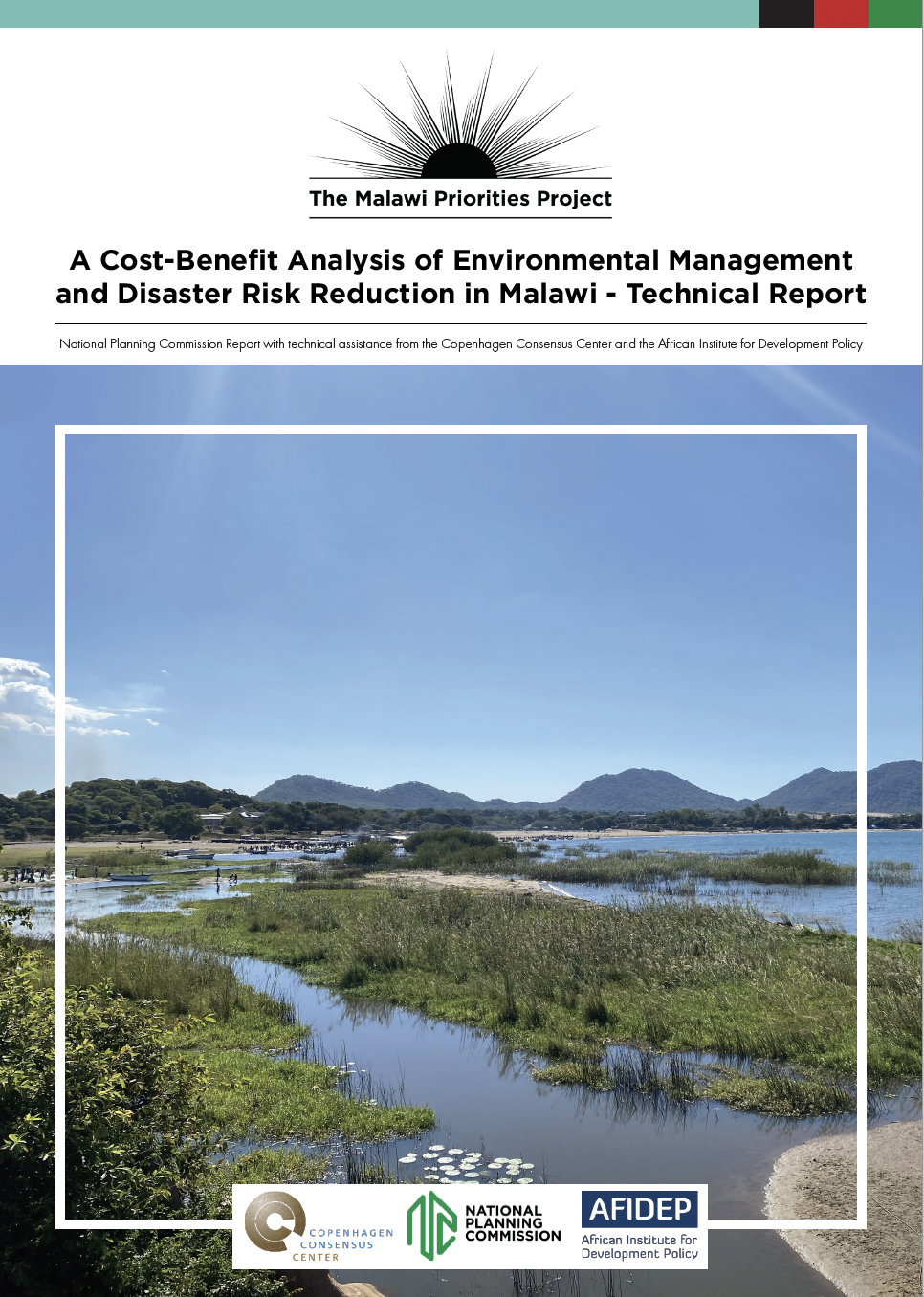
The analysis recommends prioritizing improvements in Malawi’s Early Warning Systems (EWS) as a more effective use of marginal resources toward improving Malawi’s resilience to floods. Overall, this intervention would yield 16 kwacha in benefits for every kwacha invested, indicating the high socio- economic efficiency of the EWS improvements for Malawi.

This study conducts cost-benefit analyses on two interventions that can address the challenges of insufficient water supply, particularly for those living in informal settlements. The first intervention is to substantially increase the supply of water by 230 million L daily with a new facility from the Shire River. This is one of the future projects identified by the Blantyre Water Board and is currently only 47% financed with a loan from India’s Exim Bank (BWB, 2021). The second intervention is the installation of E-Madzi kiosks across Blantyre, similar to the ones that have recently been rolled out in Lilongwe. These E-Madzi kiosks are automated water dispensers that replace in-person kiosks while ensuring increased access to water and lowering water costs by 65%.
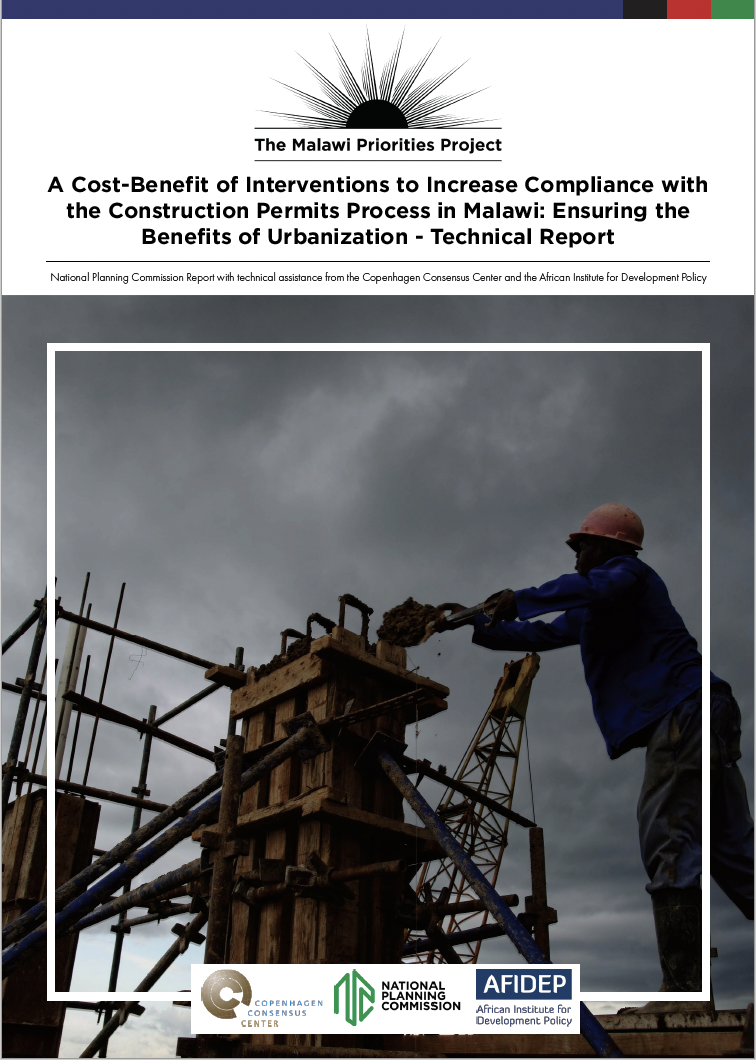
More than half of urban residents live in informal settlements or in informal dwellings in areas designated for housing. While regulations and housing permits are critical, compliance with these regulations is of equal importance. Non-compliance in Malawi’s construction sector is rooted in three challenges: poverty; the costs of compliance imposed on the private sector; and, a lack of transparency in the permit-provision process. The proposed interventions reduce the costs of building low-income housing: they create access to architectural plans that make houses more resilient; they reduce the direct cost of the construction permit process and they reduce the time associated […]

Malawi faces a wide range of barriers to achieving structural transformation of its economy and increasing the level of employment among the country’s large youth population. These barriers include infrastructure gaps, low access to finance, weak governance and regulations, inefficient markets, and low agricultural productivity among others. This analysis has focused on strengthening market linkages in agro-processing value chains and facilitating SMEs’ access to formal finance.

Tourism is a non-trivial contributor to Malawi’s GDP, and sub-optimal capacity utilization of tourism infrastructure indicates that there is opportunity for growth. The tourism industry has a definitive multiplier effect on the wider economy: it requires accommodation, arts and entertainment, food and beverages, textiles and furniture, specialized labour, security, among other things. While tourism is a function of a host of other factors (e.g. marketing efforts, weather patterns, among others), the analysis isolates the contribution of road infrastructure in the tourism sector and demonstrates the inverse relationship between the cost of travel and international arrivals.
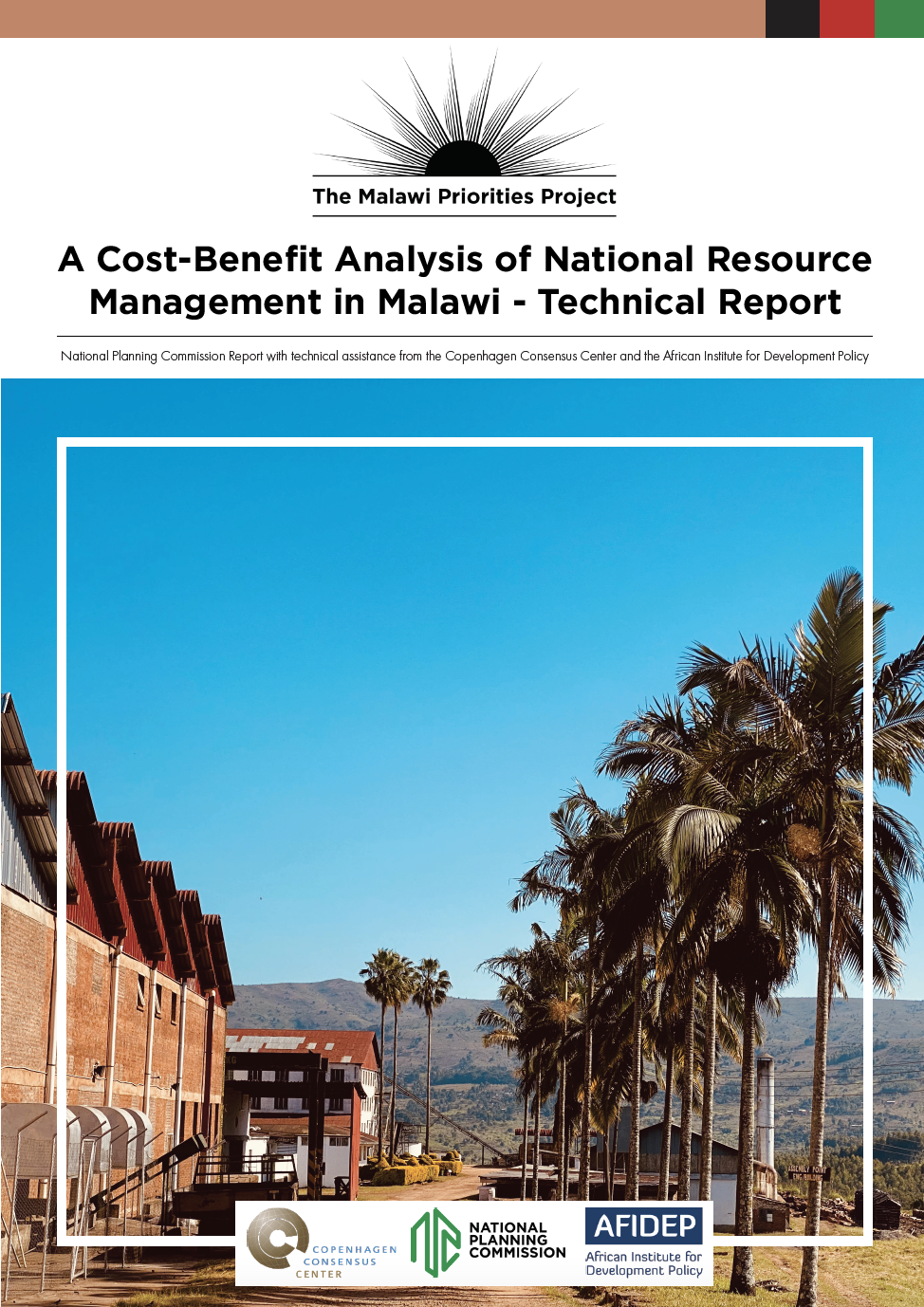
To address the research questions, “how can national resources best contribute to wealth creation?” and “what institutional structures best deliver the returns on investment in national resource management?”, the team conducted a Cost-Benefit Analysis to measure the potential impact of two possible interventions:
1. Formalization and Modernization of the ASM Sub-sector by District Landing Centers
2. Chipoka Port Fisheries and Aquaculture Infrastructure and Land Development Program
The results show that both interventions have BCRs above one. This suggests that both interventions are likely to generate positive results while remaining cost-effective.

This study conducted cost-benefit analyses on several interventions. The combination of the two interventions would have the largest absolute impact on malaria burden in the country. We do not overemphasize differences in the point estimates of the respective BCRs, since each comes with substantial uncertainty.
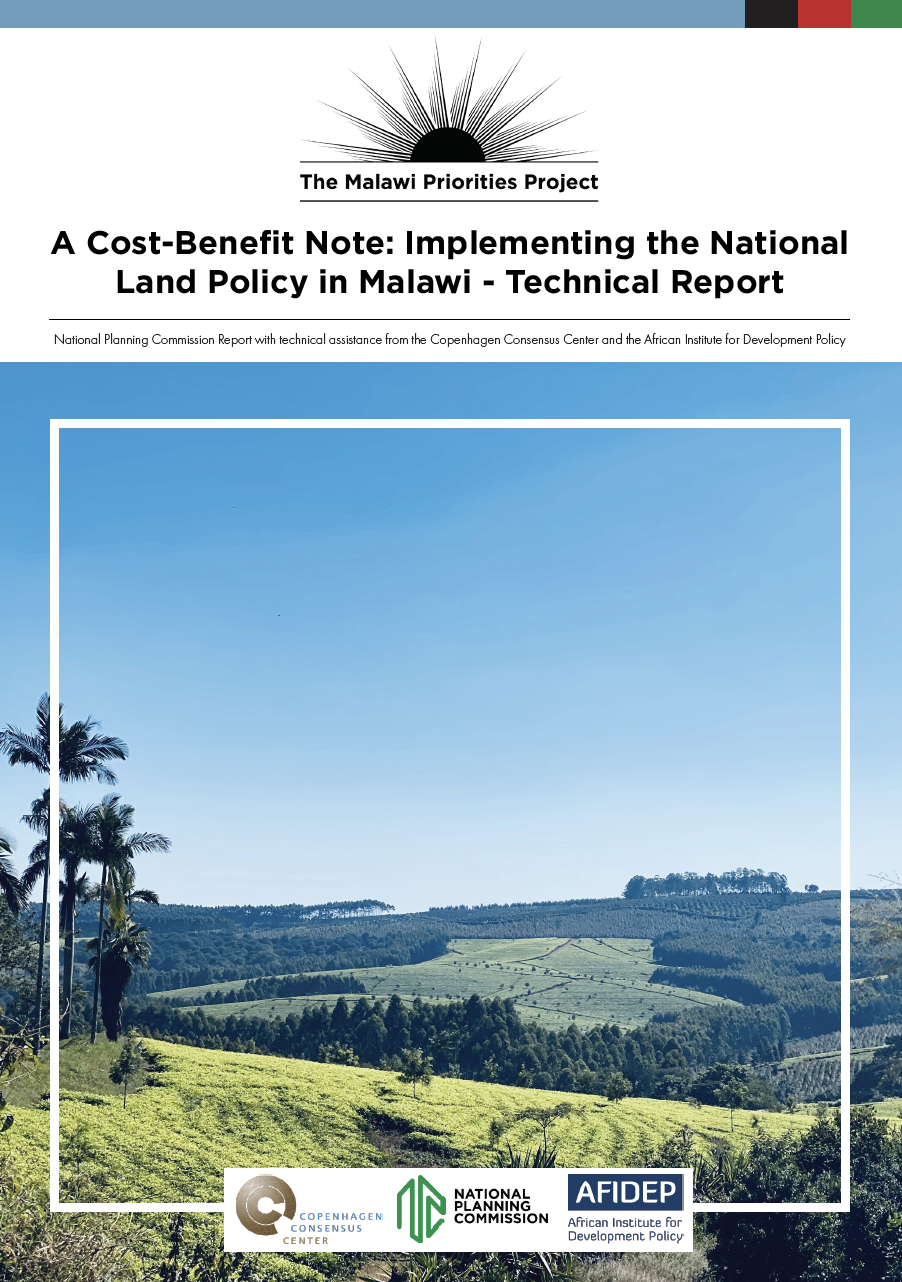
This note documents a cost-benefit analysis of scaling up land reform efforts across Malawi. The results indicate that the expected BCR is very high, at 73 kwacha for every kwacha spent. This figure is based on several assumptions – costs drawn from pilot land-titling programs in Malawi, benefits drawn from land value reports also from Malawi. The most uncertain parameter of the analysis is the expected benefit of land titling, which is proxied as a 25% and 10% increase in urban and rural land values respectively following mostly international experience. Nevertheless, sensitivity analyses show that the range of BCR values rests in the upper end of the estimated BCRs from Malawi Priorities and other Copenhagen Consensus country projects. The report provides strong impetus to ensure there are no further delays to the implementation of the land reform agenda in Malawi. For a country with an aspiration of wealth creation, land titling is one effective way to generate substantial economic benefits for the vast majority of Malawians.

Investments in early childhood are extremely advantageous for children both in the short and long term, better educational attainment leading to improved labor market outcomes and increased income. Based on extensive sector expert consultations and a review of literature, this paper examined the social and economic costs and benefits of two interventions impacting early childhood development in Malawi.
1. Expansion of CBCCs to new communities
2. Improvement of existing CBCCs
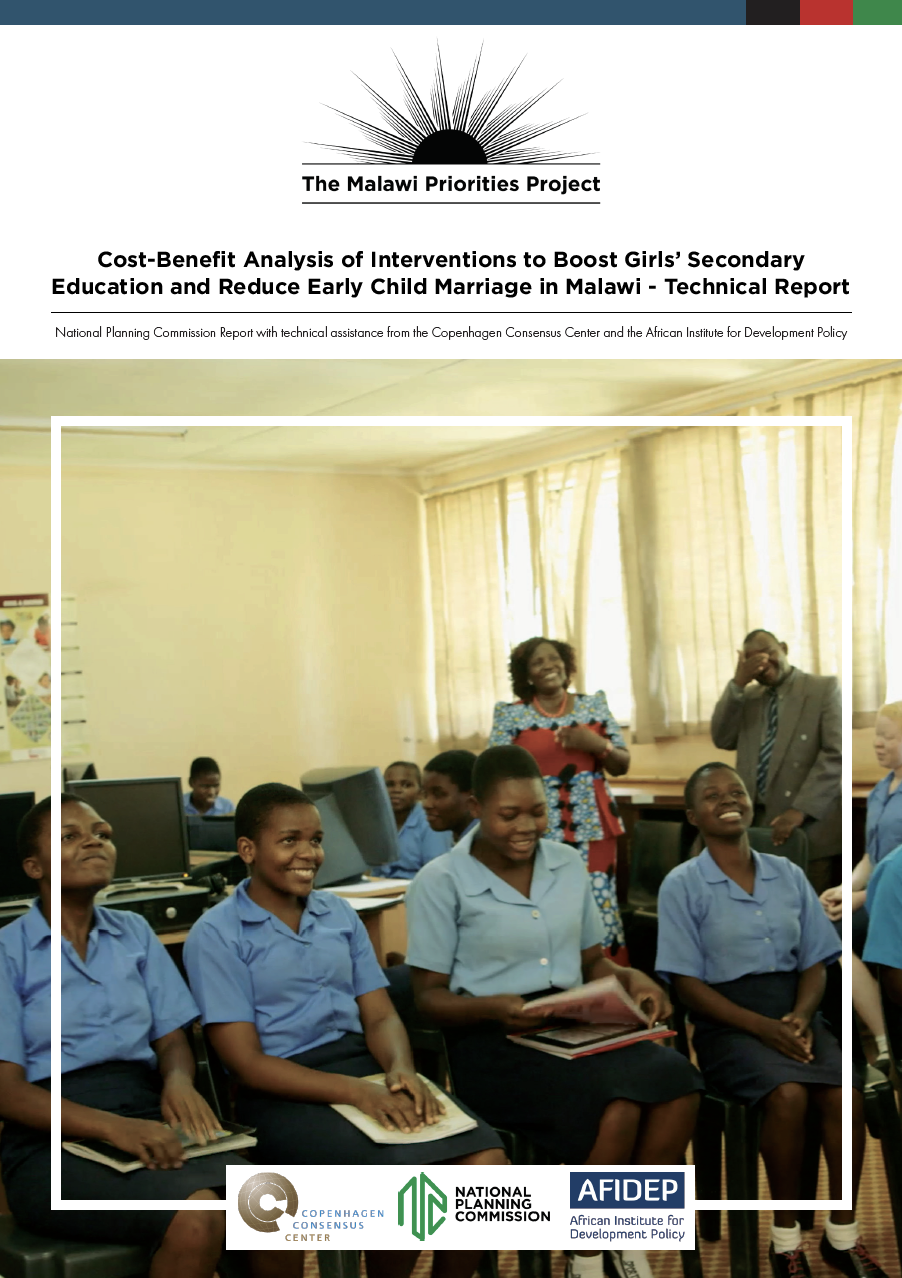
Malawi’s secondary education system suffers from perennially low gross enrollment rates. Child marriage plays a key role in this dynamic, with 43% of female dropouts being attributed to either marriage or pregnancy. Based on substantial sector expert consultation, and a review of existing policies and literature, this paper examined the social and economic return-on-investment of six interventions:
1. Increasing the number of secondary schools for girls
2. Education promotion
3. Community dialogues to prevent child marriage
4. Cash or asset transfers for girls, conditional on school enrolment
5. Child marriage survivor program to rehabilitate annulled child marriages including scholarships to return to school
6. Sexual and reproductive health and female empowerment programs

